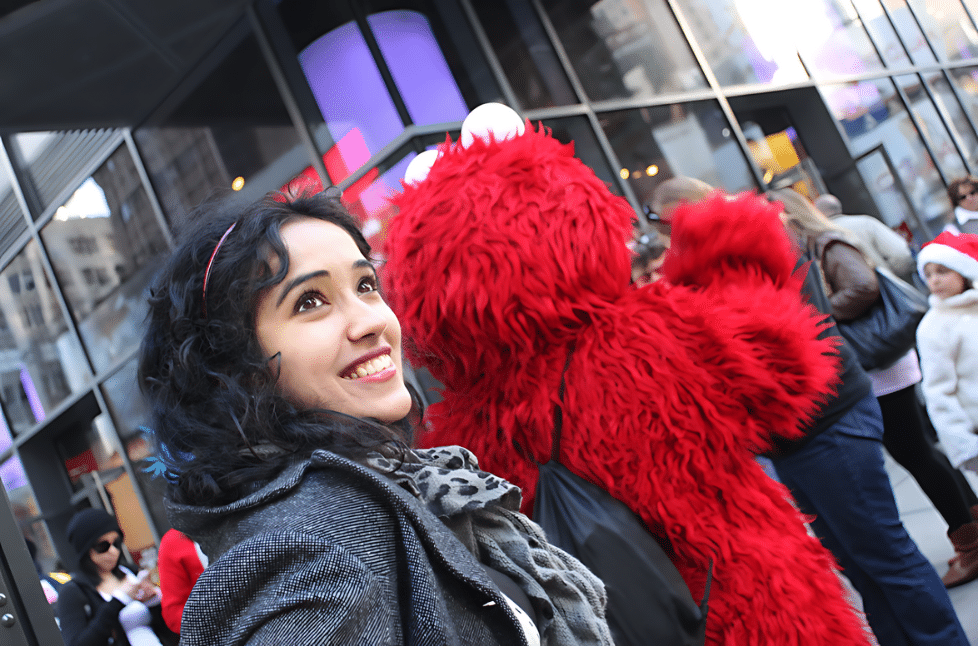By: Maria Williams
Devangana Mishra is a writer/ artist living in Mumbai, India, and runs a foundation for autism, Brain Bristle, which is headquartered in the city.
Devangana, what got you to Teachers College, Columbia University, in the first place?
I grew up with children with Down’s Syndrome and autism hanging at home to study with my mother once she returned home from being a school principal. I’d invite them to my birthday parties and to play with my friends, my family found it all very hilarious and cute. My brother and our house help, Ambalal, had taught me how to ride a bicycle in the deaf and dumb school close to our house, in Udaipur, in India.
Fast forward to when I just graduated from one of the top leading undergraduate universities in India, Lady Sriram College, to find how dismal the state of teacher education and work in the space of autism was, at least back then in 2008. For studying autism, we were in a small storage room being taught some courses I couldn’t even recall. Coincidentally, right then, I happened to meet a young teenager on the spectrum of autism, and he got very violent in a school assembly I was newly teaching at; this got me to apply to Teachers College and basically plead with them to give me admission.
Of course, I then had to work many odd jobs on campus, do some freelance gigs off campus, apply for many, many scholarships and work way harder than an American kid to survive the sixty thousand dollars I’d committed to studying autism.
Every penny was worth it, I know today.
What was it like being in the Big Apple, in New York City, besides the University?
I had family that lived there, cousins who I was very close to coddling me and showing me around the city. I began my journey in New York, living with my cousin on bunk beds of a hotel which gave out a few rooms on rent. I then moved into Harlem with a college friend and returned to my aunts’ homes in New Jersey often for home food. Honestly, studying and working on very strenuous subjects like autism and intellectual disabilities gives you little mental or emotional space to make the most of the city, but I somehow managed to live my best few years then. After my years growing up in a boarding school and then in an only women’s undergraduate school, this breath of bars, bikinis, booze, freedom and men was much welcome; Columbia University itself had its own many schools we’d run into things with, one of my closest friends was a professor at the Columbia Business School. I had to keep inventing ways to make money or scrimp on and sacrifice what wasn’t needed to live my best New York City Life.
Teachers College loves you well, though I was a chubby, chatty, always busy and bustling student.

Devangana, while at her time at Teachers College, Columbia University, New York.
Did you try to stay around in New York after your graduation and work there for a few years after?
I did apply to a few schools and centers for autism there; I already had a social security number because I was working there, and it all seemed huge if I’d got it. But then I came home for a break, and there’s this comfort about India we take for granted; we’re always looking for something better than this, but there’s so much gravity when you’re back home. I spent a few years working in hospitals there, constantly cribbing about ‘This is so much better in the States!’ but just sticking it out for a few years. I made a film on autism and worked across two hospitals back then; it was the best I could do with my young twenty-four years of life.
After all this work you did, did you back then think of starting something of your own in India, what came next?
I was entrepreneurial back then, too. I started a small bakery for autistic kids and did some things here and there, but I don’t come from a family business, so I just didn’t grow up in the spirit of running businesses; everyone thought more streamlined career-wise than in any other way. So, I ended up instead moving to one of the best schools I’ve worked in with my then partner, The Jakarta International School, and helping launch their inclusion at elementary program with a co teaching model. We were one of the first few schools in the international school circuit to experiment with that and get trained in it. We saw immense success in inclusive classrooms, and I helped share their work across conferences the world over. It was my first real big break after my time at Teachers College.
I then moved to Hong Kong and did something similar, except for an inclusive high school, The Harbour School, but I also wrote a bridge curriculum to help integrate all our high schoolers into the school well. We mainstreamed some of our boys on the spectrum who were missing out on their O Levels and APA degrees because of autistic meltdowns, we managed it all through training and education. I have to be honest. It was my most personally rewarding time, and Hong Kong was fabulous as a city; it made my heart full.
It’s easy to not shift gears when you’re settled, earning and living in a big, vibrant city. Why did you leave Hong Kong, the city of everything, to move to India?
I had just got an offer to do something similar in another BIG international school in Hong Kong, paying me way more zeros in money than I’d ever imagined, but then I interviewed with Teach For India for a role on their leadership team, looking to recruit Fellows into teaching. I’d been in the field of teaching for so long, it felt only natural to study for it and interview for the position. After many rounds of grueling, I was in!
Being on the leadership team of one of the biggest non-profits in India was huge.
What was it like shifting gears from working, teaching, writing, and creating small teams in schools to leading a large team at Teach For India?
I’d never coached and managed adults at work. I’d supported colleagues, helped them in their work, and held workshops and training for most of my roles, but this was all very new and different. Of all my professional life, besides bringing in the Fellows and seeing how huge, many, many thousand people organizations work, it also taught me more than I’d ever learned. I went through a huge learning curve, working many, many hours a day, just to get a sense of how different this was from anything I’d done before yet similar except I had to use a slightly different mindset because all our work was at a much, much larger scale than I’d ever known.. It was all the professional learning I needed to begin work in autism, in India, under Brain Bristle.
Last question, tell us about Brain Bristle, the foundation you run out of Mumbai, India?
The idea is basically a lot of what I’ve always done, just in more difficult and unexposed areas, trying to rally people into doing things they’ve never done. India has over eighteen million diagnosed autistic people; one of every hundred under ten-year-olds is on the autism spectrum; the data is still short; there must be so much more.
Mumbai municipal schools, or any other state-run schools in India, have probably never seen the work of excellent inclusion of autism, the work of possibilities that lie in an undiagnosed autistic kid in a classroom; you can’t imagine what you’ve never thought of, that’s the imagination and education I’m trying to bring to a select few teachers by training them in inclusion, autism and then through them excel students and sensitize staff members in, to begin with, Mumbai municipality schools. Then, go on to share research, share findings, share awareness and education across cities and organizations. All done in bits, all done with patience, practice, presence and peace.
Published by: Martin De Juan

















